Chemical irritants - Study guides, Class notes & Summaries
Looking for the best study guides, study notes and summaries about Chemical irritants? On this page you'll find 549 study documents about Chemical irritants.
All 549 results
Sort by
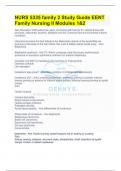
-
NURS 5335 family 2 Study Guide EENT Family Nursing II Modules 1&2| Non-Ulcerative: A/W seborrhea; seen commonly with trisomy 21; affects those with psoriasis, seborrhea, eczema, allergies and lice. Chemical and environmental irritants contribute Ulcerati
- Exam (elaborations) • 21 pages • 2024
-
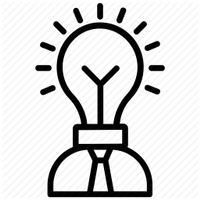 dennys
dennys
-
- $14.49
- + learn more
Non-Ulcerative: A/W seborrhea; seen commonly with trisomy 21; affects those with psoriasis, seborrhea, eczema, allergies and lice. Chemical and environmental irritants contribute Ulcerative:Involves the lash follicle & the Meibomian glands of the eyelid.May be pustules at the base of the hair follicle that crust & bleed.Lashes break easy., Blepharitis treatment,hordeolum s/s?,Ocular rosacea Contact dermatitis, Atopic Kerato-conjunctivitis, Herpes simplex infection, Preseptal cellulitis,diffe...
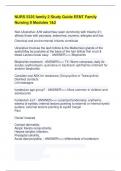
-
NURS 5335 family 2 Study Guide EENT Family Nursing II Modules 1&2| Non-Ulcerative: A/W seborrhea; seen commonly with trisomy 21; affects those with psoriasis, seborrhea, eczema, allergies and lice. Chemical and environmental irritants contribute Ulcerati
- Exam (elaborations) • 30 pages • 2024
-
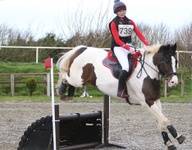 leonrafa
leonrafa
-
- $15.49
- + learn more
Non-Ulcerative: A/W seborrhea; seen commonly with trisomy 21; affects those with psoriasis, seborrhea, eczema, allergies and lice. Chemical and environmental irritants contribute Ulcerative:Involves the lash follicle & the Meibomian glands of the eyelid.May be pustules at the base of the hair follicle that crust & bleed.Lashes break easy., Blepharitis treatment,hordeolum s/s?,Ocular rosacea Contact dermatitis, Atopic Kerato-conjunctivitis, Herpes simplex infection, Preseptal cellulitis,different...
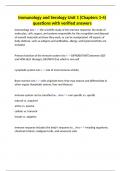
-
Immunology and Serology Unit 1 (Chapters 1-4) questions with verified answers
- Exam (elaborations) • 18 pages • 2025
-
cracker
-
- $17.99
- + learn more
Immunology Ans-the scientific study of the immune response; the study of molecules, cells, organs, and systems responsible for the recognition and disposal of nonself materials and how they work, or can be manipulated. All aspects of body defense, such as antigens and antibodies, allergy, and hypersensitivity are included. Primary function of the immune system Ans-DIFFERENTIATE between SELF and NON-SELF (foreign); DESTROY that which is non-self Lymphatic system Ans-site of most immune acti...
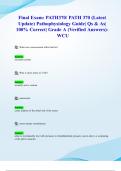
-
Final Exam: PATH370/ PATH 370 (Latest 2024/ 2025 Update) Pathophysiology Guide| Qs & As| 100% Correct| Grade A (Verified Answers)- WCU
- Exam (elaborations) • 73 pages • 2024
-
Available in package deal
-
nurse_steph
-
- $11.49
- + learn more
Final Exam: PATH370/ PATH 370 (Latest 2024/ 2025 Update) Pathophysiology Guide| Qs & As| 100% Correct| Grade A (Verified Answers)- WCU Q: What can vesicoureteral reflux lead to? Answer: recurrent cystitis Q: Who is more prone to UTIs? Answer: sexually active women Q: ureterocele Answer: cystic dilation of the distal end of the ureter Q: stress urinary incontinence Answer: urine is involuntarily lost with increases in intraabdominal pressure; occ...
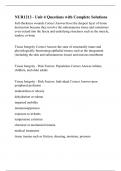
-
NUR1213 - Unit 4 Questions with Complete Solutions
- Exam (elaborations) • 39 pages • 2024
-
cracker
-
- $15.99
- + learn more
Full-thickness wounds Correct Answer-have the deepest layer of tissue destruction because they involve the subcutaneous tissue and sometimes even extend into the fascia and underlying structures such as the muscle, tendon, or bone Tissue Integrity Correct Answer-the state of structurally intact and physiologically functioning epithelial tissues such as the integument (including the skin and subcutaneous tissue) and mucous membrane Tissue Integrity - Risk Factors: Population Correct Answer-...
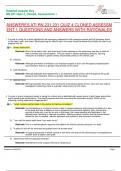
-
ANSWERES ATI RN 231 231 QUIZ 4 CLONED ASSESSM ENT 1 QUESTIONS AND ANSWERS WITH RATIONALES
- Exam (elaborations) • 23 pages • 2023
-
 osorebrilliant
osorebrilliant
-
- $11.49
- 2x sold
- + learn more
ANSWERES ATI RN 231 231 QUIZ 4 CLONED ASSESSM ENT 1 QUESTIONS AND ANSWERS WITH RATIONALES 1. A nurse is caring for a client admitted to the emergency department with extensive partial and full-thickness burns of the head, neck, and chest. While planning the client's care, the nurse should be aware that initially the client is at greatest risk for A. airway obstruction. Rationale: Burns of the head, neck, and chest may involve damage to the pulmonary tree due to heat as well as smoke and ...
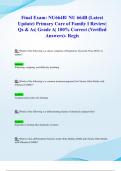
-
Final Exam: NU664B/ NU 664B (Latest 2024/ 2025 Update) Primary Care of Family I Review| Qs & As| Grade A| 100% Correct (Verified Answers)- Regis
- Exam (elaborations) • 10 pages • 2024
-
Available in package deal
-
nurse_steph
-
- $10.49
- + learn more
Final Exam: NU664B/ NU 664B (Latest 2024/ 2025 Update) Primary Care of Family I Review| Qs & As| Grade A| 100% Correct (Verified Answers)- Regis Q: Which of the following is a classic symptom of Respiratory Syncytial Virus (RSV) in infants? Answer: Wheezing, coughing, and difficulty breathing Q: Which of the following is a common treatment approach for Chronic Otitis Media with Effusion (COME)? Answer: Tympanostomy tubes for drainage Q: Which of the following is a ...
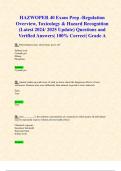
-
HAZWOPER 40 Exam Prep -Regulation Overview, Toxicology & Hazard Recognition (Latest 2024/ 2025 Update) Questions and Verified Answers| 100% Correct| Grade A
- Exam (elaborations) • 32 pages • 2024
-
Available in package deal
-
nurse_steph
-
- $10.99
- + learn more
HAZWOPER 40 Exam Prep -Regulation Overview, Toxicology & Hazard Recognition (Latest 2024/ 2025 Update) Questions and Verified Answers| 100% Correct| Grade A Q: Polyurethane foam, when burnt, gives off: Sulfuric acid Cyanide gas Ethane Phosphine Answer: Cyanide gas Q: Animal studies provide most of what we know about the dangerous effects of toxic substances. Humans may react differently than animals exposed to toxic materials. False True Answer: True Q: A(n...
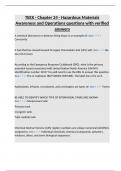
-
TEEX - Chapter 24 - Hazardous Materials Awareness and Operations questions with verified answers
- Exam (elaborations) • 7 pages • 2025
-
cracker
-
- $17.49
- + learn more
A chemical that burns or destroys living tissue is an example of: Ans-Corrosivity A fuel that has moved beyond its Upper Flammable Limit (UFL) will: Ans-Be too rich to burn According to the Emergency Response Guidebook (ERG), what is the primary potential hazard associated with United Nation/North America (UN/NA) identification number 1012? You will need to use the ERG to answer this question. Ans-Fire or explosion (BUTYLENES MIXTURE). The label has a fire on it. Asphyxiants, irritants,...
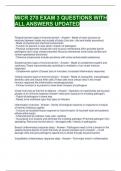
-
MICR 270 EXAM 3 QUESTIONS WITH ALL ANSWERS UPDATED
- Exam (elaborations) • 26 pages • 2024
-
 Perfectscorer
Perfectscorer
-
- $12.49
- + learn more
MICR 270 EXAM 3 QUESTIONS WITH ALL ANSWERS UPDATED Physical barriers (type of immune barrier) - Answer-- Made of every structure at interface between inside and outside of body (Like skin, cilia and bodily secretions) - Made of physical and chemical components - Function to prevent or slow down invasion of pathogens - Physical components include skin and mucous membranes (Skin provides barrier pathogens can't cross unless breached; Mucous membranes cover body cavities and contain specialize...

Did you know that on average a seller on Stuvia earns $82 per month selling study resources? Hmm, hint, hint. Discover all about earning on Stuvia


